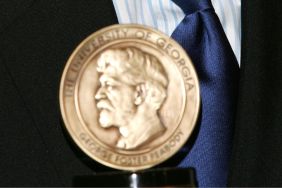Cast:
Josh Brolin as George W. Bush
Elizabeth Banks as Laura Bush
James Cromwell as George Herbert Walker Bush
Ellen Burstyn as Barbara Bush
Richard Dreyfuss as Dick Cheney
Rob Corddry as Ari Fleischer
Toby Jones as Karl Rove
Stacy Keach as Earle Hudd
Ioan Gruffudd as Tony Blair
Jeffrey Wright as General Colin Powell
Thandie Newton as Condoleezza Rice
Michael Gaston as General Tommy Franks
Scott Glenn as Donald Rumsfeld
Dennis Boutsikaris as Paul Wolfowitz
Sayed Badreya as Saddam Hussein
Jason Ritter as Jeb Bush
Marley Shelton as Fran
Brinkley A. Maginnis as Anita Bush
Noah Wyle as Don Evans
Jesse Bradford as Thatcher
Wes Chatham as Jimmy Benedict
Charles Fathy as Jacques Chirac
Bruce McGill as George Tenet
Randall Newsome as Paul Bremer
David Born as Moderator
Directed by Oliver Stone
Summary:
Excellent performances by Brolin, Cromwell and others get lost within a generally dull piece of political fantasy fiction trying to sell itself as an entertaining biopic.
Story:
Before President George Walker Bush (Josh Brolin) became our 43rd President, he had to get past years of alcohol abuse and trying to live up to the expectations of his father (James Cromwell).
Analysis:
The question that will probably be on many minds after watching Oliver Stone’s film about George Walker Bush is why on earth someone known for their liberal viewpoints might spend so much time exploring a subject that’s been covered aptly in so many documentaries? That’s not to say that the life and background of our current President has been the central focus of these docs, but the war in Iraq and what led up to it certainly has, and that’s really what this movie is about, rather than being a biopic in the normal use of the term. Apparently, Stone wanted to explore the decisions and mistakes that went into invading Iraq, and decided to disguise it as a biopic by showing key moments from the life of George W. leading up to him becoming President.
The film starts in 2003 with a cabinet meeting between President Bush and his closest advisors, discussing what to do about the situation in Iraq, how the country may be harboring terrorists and hiding “WMDs.” From there, we flashback to earlier times, from Bush’s college years undergoing the initiation rituals for his fraternity to meeting his future wife Laura and his early days before finding religion and entering politics. The younger Bush is depicted like a alcoholic f*ck-up slacker more interested in baseball than politics or the jobs his “Pappy” delivers to him on a silver platter. At the same time, “Junior” is constantly trying to get the approval of his father, who instead backs his younger brother Jed (Jason Ritter) and his decision to follow in his father’s political footsteps before George Jr. gets his religious epiphany.
Brolin does a seamless “impression” of George W., one that’s so good you often forget you’re watching an actor playing what may be the role of his lifetime. On one level, it’s an impressive piece of acting as Brolin pulls off Bush’s cocky drawl, and the ego and pride that must have gone into some of his decisions. Brolin does intentionally make Bush look even more buffoonish at times, but he also brings a poignancy to the character that’s surprising. It may not have been Stone’s intentions to create a sympathetic portrait of our President, but that’s exactly what he does by creating such a balanced and well-rounded portrayal. Brolin is even more impressive in the scenes where Stone recreates some of the famous Bush speeches we’ve seen on the news, further blurring the facts from the fiction, but it’s a grueling experience to watch for anyone who’s incredulous that the American people that reelected Bush have forced him upon the rest of us for the past four years.
Although his portrayal of Bush the Senior isn’t nearly as well-rounded, James Cromwell is equally strong in the scenes where the two George Bushes face each other, including an intriguing scene where W. reacts to his father’s handling of the first Iraq war.
Weiser’s script is a solid one with well-written dialogue across the board, but it’s hard to imagine what kind of research he could have possibly done to allow us into the room with such intimate family moments, so one immediately assumes they were fictionalized using guesswork and conjecture. To make things more confusing, Stone throws in a few quizzical dream sequences that makes one further question how much of the movie should be believed. When you compare this to the research done by Peter Morgan for “The Queen,” “W.” comes across more like Oliver Stone’s “Passion of The Christ.”
Despite the marketing of the film playing up the comical nature of Bush’s personathere are certainly a few Bushisms that his critics will find amusingthe movie isn’t particularly funny. So much of the movie is comprised of dry political analysis and the ethical discussions that may have occurred during closed-door meetings between the President and his staff, as the movie always returns there after each flashback. Adding to the cinematic nature of this political fantasy, Stone has created “good guys” in Dick Cheney, Colin Powell and Tony Blair and bad guys in Donald Rumsfeld, Condaleeza Rice and Karl Rove. Many of the characterizations take the viewer out of the movie, especially Thandie Newton’s take on Condoleezza, which seems so comical it’s jarring whenever she opens her mouth to speak. On the other hand, Richard Dreyfuss is excellent as Dick Cheney, having some great moments with both Bushes while they’re trying to decide the Middle East situation, the younger Bush arrogantly dismissing his more experienced VP’s advice.
The last half hour of the movie remains in the “present day” to show the repercussions of their decision, and in a sense Stone does partially succeed at proving his theory that Bush was never ready or competent enough to take on the presidency… but again, this is all based on conjecture from the facts we do know. Going by Stone’s version of events, the invasion of Iraq was ultimately decided by Bush’s ego, as a way to “show his father how to win a war,” though the movie also makes it seem that he wasn’t nearly as active in the decision-making process as others around him. It’s that kind of dichotomy that hurts Stone’s case, and some might even walk away feeling like Stone is making excuses for Bush’s involvement in the Iraq mess, something that’s harder to digest than some of the blatantly fictionalized scenes based around the facts we do know about Bush’s life.
The Bottom Line:
An interesting experiment in political fan fiction and a better-realized film than Stone’s last few movies thanks to a strong screenplay and solid performances, “W.” is neither the scathing indictment of our 43rd President nor the definitive biography some might expect. Stone’s attempts to be fair and balanced rather than just taking sides ultimately hurts the movie, since it never really feels like the truth. Either way, considering that we’ve spent eight years with Bush as President, one has to wonder why anyone might want to spend two more hours reliving his mistakes and why Stone waited until now to share his insights into them?










